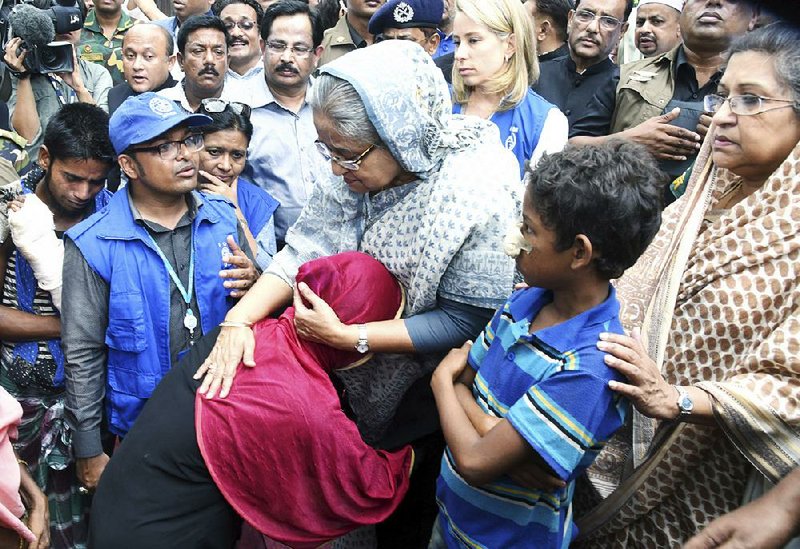UKHIYA, Bangladesh -- The Bangladeshi prime minister demanded Tuesday that Burma allow the return of hundreds of thousands of Rohingya Muslims who fled recent violence in the Buddhist-majority nation -- a crisis she said left her speechless.
Prime Minister Sheikh Hasina said Bangladesh would offer the refugees temporary shelter and aid but that Burma should soon "take their nationals back."
"We will not tolerate injustice," she said at a rally at the Kutupalong refugee camp near the border town of Ukhiya in Cox's Bazar district.
On Monday night, she lambasted Burma for "atrocities" that she said had reached a level beyond description, telling lawmakers she had "no words to condemn Myanmar."
Burma is often called Myanmar, a name that military authorities adopted in 1989. Some nations, such as the United States and Britain, have refused to adopt the name change.
At least 370,000 Rohingya have flooded into Bangladesh since Aug. 25, when Rohingya insurgents attacked police posts, prompting Burma's military to retaliate with what it called "clearance operations" to root out the rebels.
The crisis has drawn sharp criticism from around the world. On Tuesday, Iran's Supreme Leader Ayatollah Ali Khamenei called the killing of Muslims a political disaster and called Suu Kyi a "brutal woman." U.N. human-rights chief Zeid Ra'ad al-Hussein said the Rohingya were victims of what "seems a textbook example of ethnic cleansing."
Two human-rights groups on Tuesday accused the U.N. Security Council of ignoring the crisis. Human Rights Watch and Amnesty International spoke at U.N. headquarters ahead of private council discussions today about the Burma situation.
Louis Charbonneau, the U.N. director for Human Rights Watch, said, "This is an international peace and security crisis" and there is no excuse for the Security Council "sitting on its hands."
The Organization of Islamic Cooperation, the world's largest Muslim body, urged Burma to allow in U.N. monitors so they can investigate what it alleges is systematic brutality against the Rohingya. The U.N. Human Rights Council approved an investigative mission earlier this year, but Burma in June refused to allow it to enter. An envoy's visit in July was met with protests.
Meanwhile, a Rohingya villager in Burma said security forces had arrived Monday in the village of Pa Din village, firing guns, setting new fires to homes and driving hundreds of Rohingya to flee.
"People were scared and running out of the village," the villager said, speaking on condition of anonymity out of fear for his safety.
Burmese police disputed that, saying the houses were burned by terrorists they called Bengalis. That term is used derisively by many in Burma to describe the Rohingya, who they say migrated illegally from neighboring Bangladesh, though many Rohingya families have lived in Burma for generations.
Burma's military said Rohingya villagers helped them arrest six suspected Rohingya insurgents armed with swords and slingshots on Monday. The military commander in chief's office said Tuesday on its Facebook page that the six alleged insurgents were detained as they entered Ka Nyin Tan village in Maungdaw township.
In Bangladesh, Kutupalong and another pre-existing Rohingya camp were already beyond capacity. Bangladesh has said it would provide 2,000 acres for a new camp in Cox's Bazar district to help shelter newly arrived Rohingya. The government was also fingerprinting and registering new arrivals.
Some new arrivals were staying in schools or huddling in makeshift settlements with no toilets along roadsides and in open fields. Basic resources were scarce, including food, clean water and medical aid.
Aid agencies have been overwhelmed by the influx of Rohingya, many of whom are arriving hungry and traumatized after walking for days through jungles or being packed into rickety wooden boats in search of safety in Bangladesh.
Many tell similar stories -- of Burmese soldiers firing indiscriminately on their villages, burning their homes and warning them to leave or die. Some say they were attacked by Buddhist mobs.
Rohingya have faced decades of discrimination and persecution in Burma and are denied citizenship despite centuries-olds roots in the Rakhine region.
Before Aug. 25, Bangladesh had already been housing some 500,000 Rohingya who arrived after bloody anti-Muslim rioting in 2012 or amid earlier persecution drives in Burma.
Information for this article was contributed by Julhas Alam of The Associated Press.
A Section on 09/13/2017
